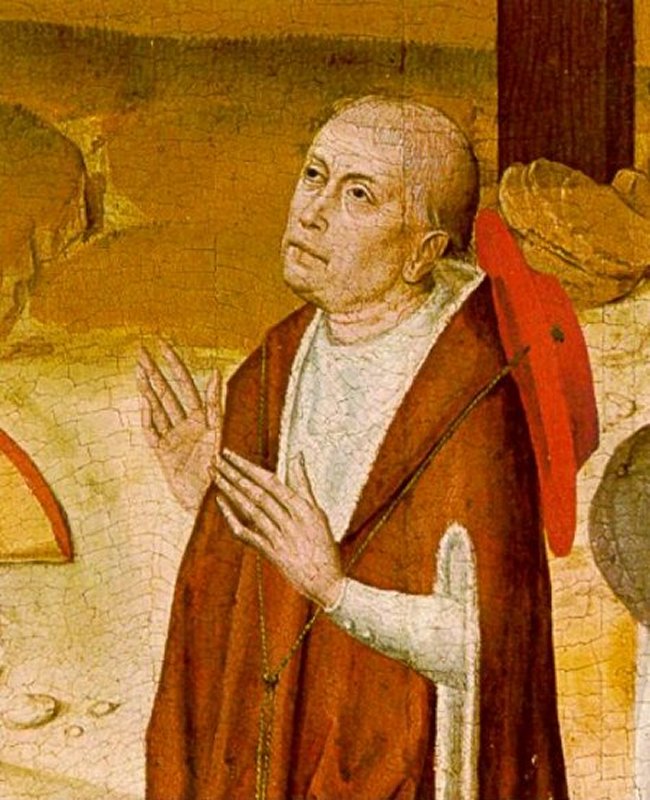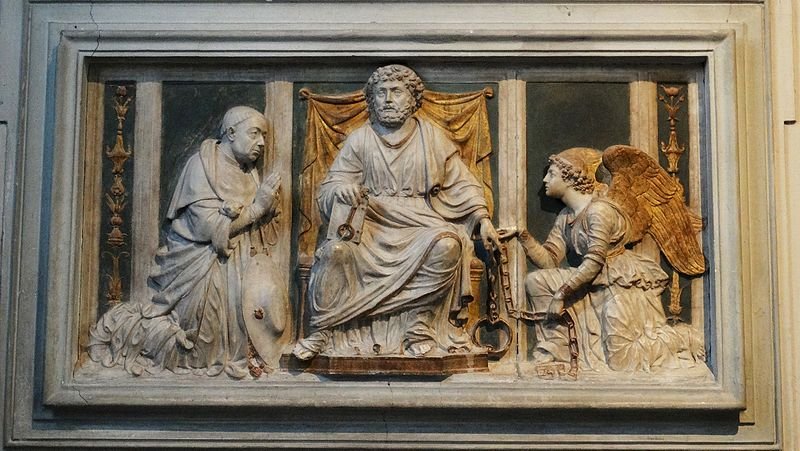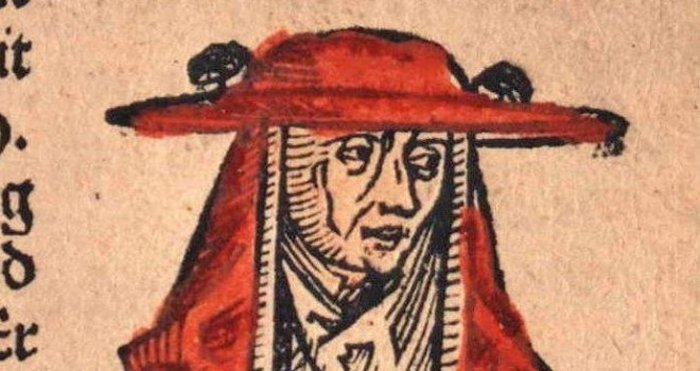Nicholas Of Cusa – A Medieval Scholar And Mystic With Highly Unorthodox Ideas
Ellen Lloyd - AncientPages.com - Nicholas of Cusa, also known as Nicolaus Cusanus, Nicholas of Kues, and Nicolaus Krebs, was a man who wasn't afraid of speaking his mind and voice opinions that were unorthodox at that time.
Not only did he opposed Aristotle's views that Earth was the center of the Universe, but he also argued for the existence of extraterrestrials.
Nicholas of Cusa. Credit: Public Domain
Nicholas of Cusa was a priest who lived in the 15th century. You might think that his challenging views would be troublesome for the Vatican, but his thought-provoking opinions views did not stop him from becoming a cardinal later.
Officially, the idea that there might be extraterrestrial life in the Universe became first known in the 20th Century as the theory of the Plurality of Worlds. Nicholas of Cusa was a thinker ahead of his time.
Nicholas of Cusa had a unique view of extraterrestrial life. In his book De docta ignorantia, i.e., Learned Ignorance (1439-40) he clearly expressed that extraterrestrials exist living on other planets:
"Life, as it exists on Earth in the form of men, animals, and plants, is to be found, let us suppose in a high form in the solar and stellar regions. Rather than think that so many stars and parts of the heavens are uninhabited and that this earth of ours alone is peopled - and that with beings perhaps of an inferior type - we will suppose that in every region there are inhabitants, differing in nature by rank and allowing their origin to God, who is the center and circumference of all stellar regions.
Of the inhabitants then of worlds other than our own, we can know still less having no standards by which to appraise them.
It may be conjectured that in the area of the sun, there exist solar beings, bright and enlightened denizens, and by nature, more spiritual than such as may inhabit the moon - who are possibly lunatics - whilst those on earth are more gross and material."
Tomb of Nicholas of Cusa. Basilica of S. Pietro in Vincoli, Rome. Image credit: Luciano Tronati - CC BY-SA 4.0
It would seem that Nicholas of Cusa had difficulties making up his mind on the nature of these extraterrestrial beings.
Sometimes when writing that the Earth is perhaps inhabited by lesser beings" than dwell on other globes, he argued that mankind is inferior. On other occasions, he said that mankind is superior. He said, for example that there is nothing nobler and more perfect than our spiritual nature.
Nicholas of Cusa was not being logically consistent neither he nor we do know the nature of extraterrestrials.
Nicholas of Cusa contemplated the existence of extraterrestrials because he opposed Aristotle's views that Earth was the center of the Universe. In his opinion, God was the center of the universe, not the Earth.
"The universe has no circumference, for if it had a center and a circumference, there would be some and something beyond the world, suppositions which are wholly lacking in truth.
Credit: Public Domain
Since, therefore, it is impossible that the universe should be enclosed within a corporeal center and corporeal boundary, it is not within our power to understand the universe, whose center and circumference are God. And though the universe cannot be infinite, nevertheless it cannot be conceived as finite since there are no limits within which it could be confined."
Since God is outside the physical world, an intelligent being's rightful place is anywhere. There could be animals, plants, and even intelligent beings on other planets.
The writings and ideas of Nicholas of Cusa did not go unnoticed. He became an inspiration for several astronomers and great thinkers such as Giordano Bruno and Tomaso Campanella.
Both René Descartes in the 17th Century and the French astronomer François Arago in the 19th Century cite Nicholas as a religious man who believed in the Plurality of Worlds. Nicholas of Cusa was also mentioned by Christian Huygens, the Bishops John Wilkins and Francis Godwin, and Otto von Guericke in the 17th Century, and Voltaire in the 18th Century. They often cited him on whether extraterrestrials are superior or inferior to man.
Nicholas of Cusa endorsed the idea of other inhabited worlds. Today, it is an idea that few would debate, but it was an unorthodox and challenging theory in his times.
Written by - Ellen Lloyd – AncientPages.com
Copyright © AncientPages.com All rights reserved. This material may not be published, broadcast, rewritten or redistributed in whole or part without the express written permission of AncientPages.com
More From Ancient Pages
-
 Olmec Civilization Remains An Intriguing Ancient Puzzle
Civilizations | Feb 2, 2017
Olmec Civilization Remains An Intriguing Ancient Puzzle
Civilizations | Feb 2, 2017 -
 Discoveries In The Hanged Man Cave, Kostkowice, Poland
News | Sep 16, 2015
Discoveries In The Hanged Man Cave, Kostkowice, Poland
News | Sep 16, 2015 -
 Mysterious Clay Tablet Reveals Babylonians Used Trigonometry 1,000 Years Before Pythagoras
Archaeology | Aug 24, 2017
Mysterious Clay Tablet Reveals Babylonians Used Trigonometry 1,000 Years Before Pythagoras
Archaeology | Aug 24, 2017 -
 Fascinating Discovery Of An Inhabited Underground World In Medieval Wales
Featured Stories | Mar 2, 2024
Fascinating Discovery Of An Inhabited Underground World In Medieval Wales
Featured Stories | Mar 2, 2024 -
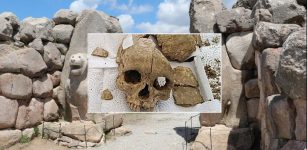 3,500-Year-Old Skull And Thighbone Discovered In Sapinuwa Antique City Of Central Anatolia
Archaeology | Dec 3, 2019
3,500-Year-Old Skull And Thighbone Discovered In Sapinuwa Antique City Of Central Anatolia
Archaeology | Dec 3, 2019 -
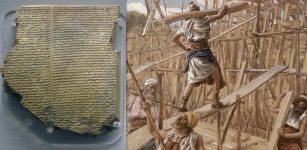 Hidden Double Message Discovered On Ancient Clay Tablet Gives A Disturbing Account Of The Great Flood
Archaeology | Dec 5, 2019
Hidden Double Message Discovered On Ancient Clay Tablet Gives A Disturbing Account Of The Great Flood
Archaeology | Dec 5, 2019 -
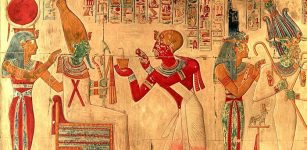 Osiris: Enigmatic And Powerful God In Ancient Egypt
Egyptian Mythology | Jun 13, 2017
Osiris: Enigmatic And Powerful God In Ancient Egypt
Egyptian Mythology | Jun 13, 2017 -
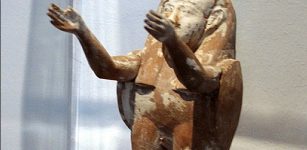 Ancient Beliefs About The Soul
Civilizations | Mar 8, 2016
Ancient Beliefs About The Soul
Civilizations | Mar 8, 2016 -
 Mysterious Rongorongo Script Remains Undeciphered – Does It Contain A Prophetic Warning?
Featured Stories | Mar 24, 2014
Mysterious Rongorongo Script Remains Undeciphered – Does It Contain A Prophetic Warning?
Featured Stories | Mar 24, 2014 -
 Why Winter Solstice Matters Around The World
Archaeoastronomy | Dec 20, 2022
Why Winter Solstice Matters Around The World
Archaeoastronomy | Dec 20, 2022 -
 Zoroaster’s Doomsday Prophecy About Comet Gochihr And Its Similarity With The Apocalypse Of John In The Book Of Revelation
Biblical Mysteries | Aug 17, 2017
Zoroaster’s Doomsday Prophecy About Comet Gochihr And Its Similarity With The Apocalypse Of John In The Book Of Revelation
Biblical Mysteries | Aug 17, 2017 -
 2,000-Years-Old Warrior Graves With Iron Swords, Mysterious Square Structures, Unearthed In Bejsce, Poland
Archaeology | Nov 21, 2019
2,000-Years-Old Warrior Graves With Iron Swords, Mysterious Square Structures, Unearthed In Bejsce, Poland
Archaeology | Nov 21, 2019 -
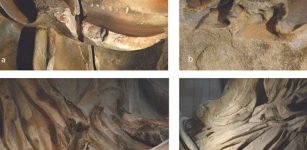 True Colors Of The Parthenon Sculptures Revealed In New Study
Artifacts | Oct 12, 2023
True Colors Of The Parthenon Sculptures Revealed In New Study
Artifacts | Oct 12, 2023 -
 Swedenborg: Man Of Unaccountable Talents, Scholar, Great Intellect And His ‘Spiritual Awakening’
Featured Stories | Jun 28, 2018
Swedenborg: Man Of Unaccountable Talents, Scholar, Great Intellect And His ‘Spiritual Awakening’
Featured Stories | Jun 28, 2018 -
 3,000-Year-Old Recycling Center In What Is Now Dubai – Discovered
Archaeology | Jan 8, 2020
3,000-Year-Old Recycling Center In What Is Now Dubai – Discovered
Archaeology | Jan 8, 2020 -
 Islands Of The Tropical Pacific Ocean Were Settled Much Earlier Than Previously Thought – New Theory
Archaeology | Dec 20, 2022
Islands Of The Tropical Pacific Ocean Were Settled Much Earlier Than Previously Thought – New Theory
Archaeology | Dec 20, 2022 -
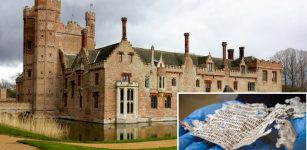 Unique Page From Rare Illuminated Manuscript And Thousands Of Treasures Found Under The Floor Of Oxburgh Hall
Archaeology | Aug 18, 2020
Unique Page From Rare Illuminated Manuscript And Thousands Of Treasures Found Under The Floor Of Oxburgh Hall
Archaeology | Aug 18, 2020 -
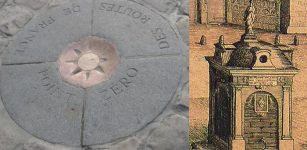 Paris Point Zero And The Mysterious Statue Of Monsieur Legris
Featured Stories | Dec 4, 2018
Paris Point Zero And The Mysterious Statue Of Monsieur Legris
Featured Stories | Dec 4, 2018 -
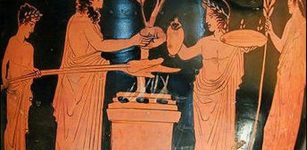 What Was The Role Of The Priests And Priestesses In Ancient Greece?
Ancient History Facts | Jul 27, 2016
What Was The Role Of The Priests And Priestesses In Ancient Greece?
Ancient History Facts | Jul 27, 2016 -
 How Did St. Nicholas Become Santa Claus? – History, Legend And Tradition
Featured Stories | Dec 22, 2023
How Did St. Nicholas Become Santa Claus? – History, Legend And Tradition
Featured Stories | Dec 22, 2023

